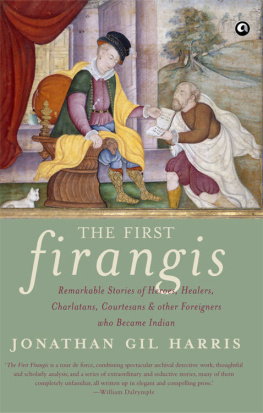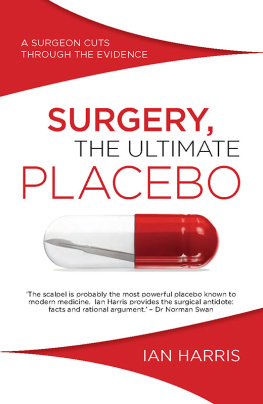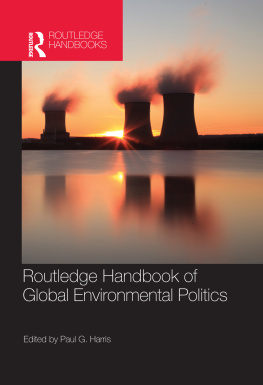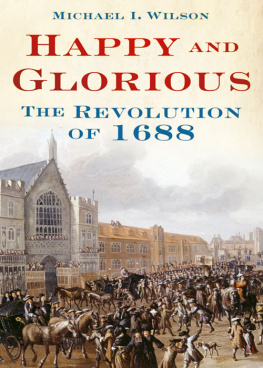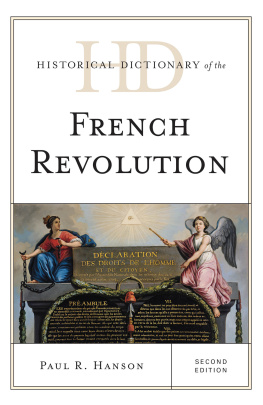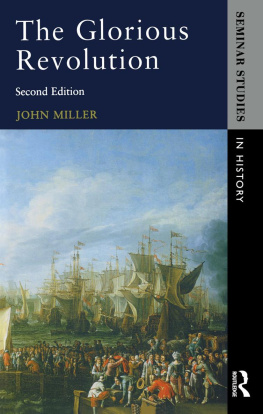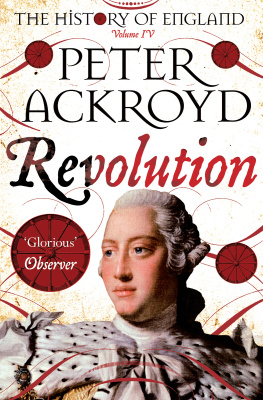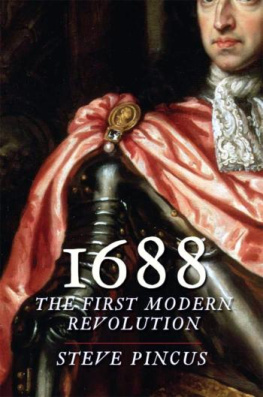PENGUIN BOOKS
REVOLUTION
Tim Harris has spent much of his teaching life rethinking and re-imagining late Stuart Britain. His fascination with the growth of popular politics, mass journalism and crowds has been expressed in a number of groundbreaking books, including London Crowds in the Reign of Charles II and Politics under the Late Stuarts. He taught for some years at Emmanuel College, Cambridge, but has since 1986 taught at Brown University, Rhode Island, where he is now Munro-Goodwin-Wilkinson Professor in European History.
In 2005 he published the widely praised Restoration: Charles II and His Kingdoms, 16601685, which is a prelude to the current book. Restoration won the 2006 John Ben Snow Prize.
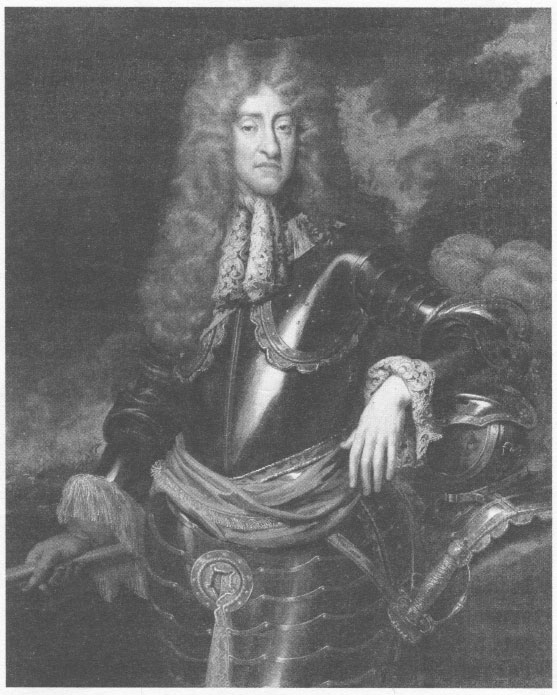
James II, by an unknown artist, c. 1690
TIM HARRIS
Revolution
The Great Crisis of the British Monarchy, 16851720

PENGUIN BOOKS
PENGUIN BOOKS
Published by the Penguin Group
Penguin Books Ltd, 80 Strand, London WC2R 0RL , England
Penguin Group (USA) Inc., 375 Hudson Street, New York, New York 10014, USA
Penguin Group (Canada), 90 Eglinton Avenue East, Suite 700, Toronto, Ontario, Canada M4P 2Y3 (a division of Pearson Penguin Canada Inc.)
Penguin Ireland, 25 St Stephen's Green, Dublin 2, Ireland (a division of Penguin Books Ltd) Penguin Group (Australia), 250 Camberwell Road,
Camberwell, Victoria 3124, Australia (a division of Pearson Australia Group Pty Ltd)
Penguin Books India Pvt Ltd, 11 Community Centre, Panchsheel Park, New Delhi - 110 017, India
Penguin Group (NZ), 67 Apollo Drive, Mairangi Bay, Auckland 1310, New Zealand (a division of Pearson New Zealand Ltd)
Penguin Books (South Africa) (Pty) Ltd, 24 Sturdee Avenue, Rosebank, Johannesburg 2196, South Africa
Penguin Books Ltd, Registered Offices: 80 Strand, London WC2R 0RL, England
www.penguin.com
First published by Allen Lane 2006
Published in Penguin Books 2007
Copyright Tim Harris, 2006
All rights reserved
The moral right of the author has been asserted
Except in the United States of America, this book is sold subject to the condition that it shall not, by way of trade or otherwise, be lent, re-sold, hired out, or otherwise circulated without the publisher's prior consent in any form of binding or cover other than that in which it is published and without a similar condition including this condition being imposed on the subsequent purchaser
ISBN: 978-0-14-192671-1
For Mark and John
Contents
PART I
The Reign of James II and VII, 16858
PART II
Revolutions in Three Kingdoms, 168891
List of Illustrations
frontispiece: James II, by an unknown artist, c. 1690 (National Portrait Gallery)
Preface
This book is a sequel to my Restoration: Charles II and His Kingdoms, 16601685 (Allen Lane, 2005). It was written first. My study of the Glorious Revolutions in the three kingdoms was initially conceived as one book, and when I first put fingertips to computer keyboard I began with what is here , working my way forward in time, before going back and drafting the earlier sections. When it became apparent that the study was too long to be published as one, the decision was taken to produce two stand-alone books. This study of the Revolutions has therefore been recast with that objective in mind. It does not require a knowledge of Restoration to be understood or enjoyed, and every effort has been made to ensure that this book is entirely self-sufficient in that sense. Having said that, the two studies are intended to be complementary, and those who have both the inclination and the time will find that there is much to be gained from reading them together.
Earlier discussions of some of the ideas and arguments developed in this book can be found in The People, the Law and the Constitution in Scotland and England: A Comparative Approach to the Glorious Revolution, Journal of British Studies, 38 (1999), 2858; Reluctant Revolutionaries? The Scots and the Revolution of 16889, in Howard Nenner, ed., Politics and the Political Imagination in Later Stuart Britain: Essays Presented to Lois Green Schwoerer (University of Rochester Press, 1997), pp. 97117; and Incompatible Revolutions? The Established Church and the Revolutions of 168889 in Ireland, England and Scotland, in Allan I. Macinnes and Jane Ohlmeyer, eds., The Stuart Kingdoms in the Seventeenth Century (Four Courts Press, Dublin, 2002), pp. 20425. Any previously published material has been reworked and recast when being incorporated into this book. However, I should like to thank the University of Chicago Press (which holds the copyright of my Journal of British Studies article), the University of Rochester Press, the Four Courts Press, and the editors of the two respective volumes, for permission to reproduce any material that happens to overlap.
In a project of this size, one inevitably accumulates numerous debts over the years. I benefited enormously from discussions with Lionel Glassey over the significance of the Scottish Claim of Right. Both Allan Macinnes and Jane Ohlmeyer gave me valuable feedback on some of the Scottish and Irish material. Steven Pincus, who is working on his own study of the Glorious Revolution (though in its European context), has been a constant source of inspiration throughout: we came to an agreement whereby I would leave the European context to Steve, and he would leave Scotland and Ireland to me and if I have learned anything from my work on James II, it is about the importance of not betraying one's friends and of honouring one's own side of the contract. Two of my graduate students Leigh Yetter and Matt Kadane gave me the benefit of their expertise on certain specific issues; all of my students (both graduate and undergraduate) have studied this material with me in various ways in classroom situations over the years, and I am deeply indebted to their input and insights.
In addition to the above, I should like to thank Charles Carlton, Tom Cogswell, Brian Cowan, Adam Fox, Mark Goldie, Mark Kishlansky, Peter Lake, Jason McElligott, John Morrill, Kalev Peekna, Lois Schwoerer, Ethan Shagan, Bill Speck, Stephen Taylor and David Underdown, for guidance on sources or discussions about interpretation and approach over the years. I have presented discrete sections of my work at conferences and colloquia across Britain and North America over the last decade or so, and I should like to thank everyone who has attended for their invaluable input; they have had a much greater influence on shaping the final outcome than they would ever have realized. I am particularly grateful to the warm welcome given to me by new friends in Edinburgh and Dublin, people whom I got to meet only after this project was in an advanced stage, but who were incredibly supportive of what I was trying to do. I only hope I have done justice to the integrity of the Irish and Scottish pasts for their own sakes. As with Restoration, I need to express my immense gratitude to the publishing team at Penguin, particularly my editor, Simon Winder, his production assistant, Alison Hennessey, my copyeditor, Charlotte Ridings, and my indexer, Caroline Wilding. Simon remains the perfect editor: inspirational and supportive, but with a great critical eye. He certainly made this work much better than it would otherwise have been and brought the best out of me. If only Simon had been able to work with James II, think how different the course of history might have been! However, if Simon had sounded out the views of Charles II or the Duke of Lauderdale beforehand for which see the Introduction I suspect he would never have offered James a contract. I certainly doubt whether my agent Clare Alexander would have taken him on with references like those, but I am delighted that she agreed to take me on and I can only hope that the end result repays in some small way all her efforts on my behalf.
Next page


